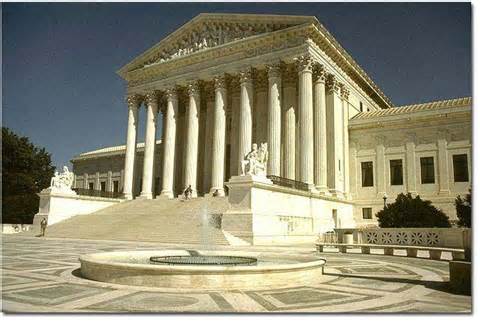The United States Supreme Court was created under Article III, Section 1 of the Constitution and the Judiciary Act of 1798. This Act organized the Supreme Court, the federal circuit courts and the federal district courts. It also established the Office of Attorney General, and reserved the president’s right to nominate justices for appointment to the United States Supreme Court with the advice and consent of the Senate.
When first created, the judicial branch was by far the weakest and most timid of the three branches, restraining itself from strongly upholding and deciding controversial issues. However, in 1801, in Marbury v. Madison, Chief Justice John Marshall asserted that the doctrine of judicial review permitted the Court to review the constitutionality of congressional legislation. In his 34 years as Chief Justice, he succeeded in strengthening the central government and making the Judiciary branch, in some respects, the strongest branch of the national government.
The Framers considered the rule of law essential to the safekeeping of social order and civil liberties. The rule of law holds that if our relationships with each other and the state are governed by a set of rules, rather than by a group of individuals, we are less likely to fall victim to authoritarian rule. The rule of law calls for both individuals and the government to submit to the law’s supremacy. By doing this, the Framers formed another protective layer over individual rights and liberties. No one was above the law. However, we see today that the rule of law is being eroded by individuals with the consent of some of the judiciary.
Note: The Constitution says nothing about using or citing international law as the basis for deciding cases before the court.
Thomas Jefferson cautioned that “The Constitution is a mere thing of wax in the hands of the Judiciary, which they may twist and shape into any form they please.” He considered that having these justices be the ultimate arbiter of all constitutional questions was a very dangerous doctrine and one that would ultimately place us under the despotism of an oligarchy – the rule of few over many. Mr. Jefferson was prophetic, for today that is what is happening in our courts.
Federal Judiciary Facts:
The United States Supreme Court consists of the Chief Justice of the United States and eight associate justices. At its discretion, and within certain guidelines established by Congress, the Supreme Court hears a limited number of the cases it is asked to decide during the year. Those cases may begin in the federal or state courts and usually involve important questions about the Constitution or federal law.
The 94 U.S. judicial districts are organized into 12 regional circuits, each of which has a United States court of appeals. A court of appeals hears cases from the district courts located within its circuit, as well as appeals from decisions of federal administrative agencies. In addition, the Court of Appeals for the Federal Circuit has nationwide jurisdiction to hear appeals in specialized cases, such as those involving patent laws, and cases decided by the Court of International Trade and the Court of Federal Claims.
The United States district courts are the trial courts of the federal court system. Within limits set by Congress and the Constitution, the district courts have jurisdiction to hear nearly all categories of federal cases, including both civil and criminal matters. There are 94 federal judicial districts, including at least one district in each state, the District of Columbia and Puerto Rico. Three territories of the United States — the Virgin Islands, Guam, and the Northern Mariana Islands — have district courts that hear federal cases, including bankruptcy cases.
There are two special trial courts that have nationwide jurisdiction over certain types of cases. The Court of International Trade addresses cases involving international trade and customs issues. The United States Court of Federal Claims has jurisdiction over most claims for money damages against the United States, disputes over federal contracts, and unlawful seizure (“takings”) of private property.
Next Week: Judicial Activism and Other Mischief
Questions for Discussion: Do federal judges have the authority to rule on marriage issues? Who should rightly decide on the regulation of marriage?

